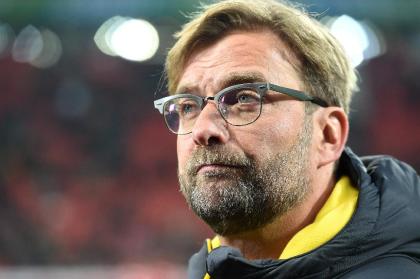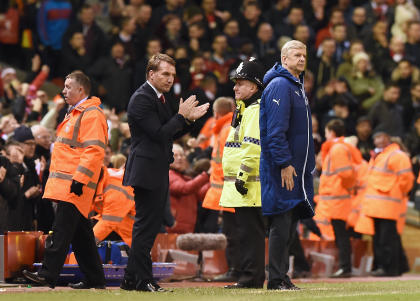Soccer's strange and surprising trend with club managers

In the soccer world, patience is not a virtue. In the fevered pursuit of wins, league titles, glory and immortality, nobody has time for introspection or long-termism. In the view of most, there is no bigger picture – only the next game.
[Premier League: Scores and Schedule | Current Standings | Teams]
Nowhere is this more true than in the job market for managers. To wit: the second-longest serving Premier League manager has been in his job two months short of four years. Nine of the 20 Premiership bosses are in their first year. Five are in their second. In Spain's La Liga, the 20 teams have conspired to make 16 managerial changes since last season. In Germany's Bundesliga, 18 teams have made 11 changes over that time span.
[La Liga: Scores and Schedule | Current Standings | Teams]
Yet something strange is happening, running counter to this often harmful trend. Lately, managers are sticking around. Some big clubs seem to have grown more patient, and their managers are returning this loyalty. Some of the hottest young soccer minds in the game have decided to stay put recently.
[Bundesliga: Scores and Schedule | Current Standings | Teams]
Atletico Madrid's firebrand manager Diego Simeone, who somehow led his side to its first La Liga title since 1996 (the first time someone other than Barcelona or Real Madrid won it in a decade) and the final of the UEFA Champions League last year, could take just about any vacant job he liked. But he extended his contract through 2020 last week.

The magnetic Jurgen Klopp oversaw Borussia Dortmund's return to the top of German soccer and masterminded back-to-back league titles in 2011 and 2012 before taking his team to the Champions League final the following year. He, too, could have signed just about anywhere and a few major clubs have looked for a manager since then. But he hung around, saying he was still in love with the club, before re-upping as well.
This season, Klopp's team came unstuck, somehow sagging to 18th and dead last in the Bundesliga by early February after four straight top-four finishes. But the club stood by him, saying it wasn't even considering firing him. Die Borussen haven't lost since, winning five of seven to climb to 10th place.
Under Frank de Boer, the one-time world class defender, Ajax has won the last four Dutch Eredivisie titles. During that span, he's been linked to all manner of Premier League jobs. But in spite of losing a star player or two every year, he has stayed and has already committed to remaining in Amsterdam for the 2015-16 season as well. This year, Ajax has fallen off and probably won't win a fifth title in as many years. The club directors told the press it understood why it had been a difficult season, and that it wasn't de Boer's fault. The youthful foundation he has laid this season, while stumbling to the bottomless depths of second place, would be paying off in the coming years, the club argued.
Many clubs still think of their managers as easily disposable and replaceable temps, who can be shown the door if they're caught on Facebook on work time, or eating the last donut from the break room. But the few clubs that buck that trend are being rewarded for it, and seeing the loyalty returned.
On Saturday, two such clubs face off when Arsenal and Liverpool meet in London.
Arsenal, forever the paradigm of stability and thoughtful management, which is such a rarity in this sport, has retained Arsene Wenger for almost 19 seasons now – doubtlessly inspired by Manchester United's success during Sir Alex Ferguson's tenure, which ran almost 27 years.
But again and again, fans and some of the press have clamored for his ouster, with the stream of trophies running almost entirely dry in the last decade. When the Gunners won just four of their first 12 league games of the season, tumbling to eighth place, those cries grew as loud as ever. Wenger survived yet again. And since then, he has tinkered with his tactics, seen his squad recover from yet another rash of injuries, and gone 14-3-1 (W-L-T). Eight of the last nine games were won, including the last five in a row, resulting in a surge from eighth to third place, just a point shy of second-place Manchester City.

On the other bench will sit Brendan Rodgers. And for a time, it didn't seem like he would make it to this game. After falling short of the league title on the final day last year, Liverpool made a shambolic start to this season. With Luis Suarez off to Barcelona, Daniel Sturridge injured and Steven Gerrard aging noticeably, Liverpool, like Arsenal, won just four of its first 12 games. But whereas Arsenal lost just three of those, Liverpool dropped six. With the club in 12th place, speculation over who would succeed Rodgers sizzled. (De Boer was often mentioned, by the way.)
In late November, Rodgers also altered his tactics, weaned himself off his Gerrard habit and turned the season around. In the 18 games since, Liverpool lost just twice – to Manchester United both times. The latter game, coming on March 22, snapped a 13-game undefeated streak.
Since those turning points, no other Premier League team has done as well. As the Wall Street Journal pointed out, if the season had started on January 1, Arsenal would sit in first place and Liverpool in second.
It seems some clubs are beginning to understand that during the unavoidable swings in form during a long soccer season, their best hope for truncating the valleys wedged around the peaks is to stick with their manager. The placebo effect of a new face wears off quickly; the problems reemerge. Who better to solve them than the person who knows the squad and its shortcomings best?
If someone was the right man for the job a few months ago, he very well might still be now. And if you stick with him when times are tough, he'll be more inclined to hang around when the going is good.
Maybe more clubs will come to these conclusions and lighten the load on their HR departments.
Until someone loses a few games in a row, of course.
Leander Schaerlaeckens is a soccer columnist for Yahoo Sports. Follow him on Twitter @LeanderAlphabet.



